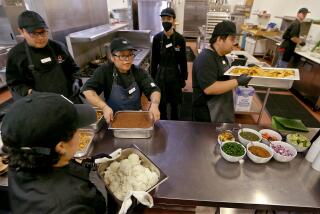Gourmets? Just Basics for These Cooks
- Share via
HYDE PARK, N.Y. — On a weekend when other kitchen classrooms at the Culinary Institute of America are packed with adults preparing paella and green mango salad, Chef Greg Zifchak is teaching Chicken Roasting 101.
Fifteen students in Zifchak’s “Cook’s Skill Development” class mimic his graceful stuffing, trussing and slicing, with uneven results. Onions are chopped tentatively and tied-up drumsticks flop around. One student holds up a green sprig and asks, “Is this thyme?”
The adult ed class illustrates a paradox: Even as “food culture” blossoms in countless cookbooks and chef shows, many adults don’t know cooking basics. Experts blame a transmission breakdown. Parents traditionally shared cooking tips with their kids, but the passage of kitchen wisdom has become less common among time-pressed modern families.
“My mother was a working woman, a career woman,” said Beth Nolcox, 38, one of the students. “There wasn’t that transfer of skills or recipes.”
Call it the lost-in-the-kitchen generation. As families began eating together less often, a sizable number of people grew up never learning to brown ground beef slowly or to add butter to minestrone to heighten flavor.
John Nihoff, a professor of gastronomy at the culinary institute who studies food culture, said that as society became more work-oriented in the ‘60s, not only was Mom more likely to work outside the home, but workdays for both parents got longer.
With Mom and Dad both out of the house more, families cooked less and relied more on store-bought food. The old tradition of Mom passing on cooking skills suffered, Nihoff said. He notes that Americans now spend $121 billion a year on “home meal replacements” -- partially or fully cooked dinners eaten at home that are bought in restaurants or supermarkets.
Many parents figure: Why roast a chicken when they’re already rotating on the spit at the supermarket?
But even in families that prepared home-cooked dinners, younger adults say the after-school focus was more on homework than cooking.
“I knew how to boil water, but my mother never said, ‘This is what you have to do.’ So I just kind of picked up everything myself,” said Laura Boggs, 22, of Albany. She took cooking lessons last summer from a “foodie” friend in return for teaching him to play guitar.
“I never touched a food processor before then,” she said.
Chef Zifchak comes across adults with kitchen knowledge gaps all the time. He said none of the students in his recent skills class handled knives correctly. And he noticed students seemed overly impressed when he demonstrated how to saute fish. “It was like, ‘Oh my God, he makes it looks too easy,’ ” he said. “And all I did was heat up oil and put a piece of fish in the pan.”
Zifchak accordingly kept his kitchen tips simple: Don’t over- stir while caramelizing onions, baste a lot for successful browning, leaning on the stove is “very dangerous.”
What’s being lost is more than just a quaint skill but an important family tradition that encourages healthier eating, said Lisa Young, a nutritionist and author of “The Portion Teller.” She said that instead of baking potatoes and broiling flounder, parents bring in French fries and deep-fried fish. A diet of that sort of food can lead to obesity and other health problems, she said.
“It’s higher in fat, higher in salt, higher in calories, bigger portions ... and it’s lower in fiber and lower in vitamins and minerals,” Young said.
There’s a danger that the problem will become self-perpetuating -- a generation without kitchen skills passes on little more than take-out ordering skills to their children. But Nihoff sees signs of change.
The renewed interest in fresh, wholesome food feeds into the notion of family cooking. People still want to cook -- particularly when they settle down to rear families, he said.
And if Mom or Dad didn’t teach them, they’re finding how-to-cook information through other sources. Cookbooks touching on everything from eggs to escargot are a booming business. Food shows are on 24-7 and there’s a rapidly growing number of culinary courses available -- like the daylong course Nolcox took with Zifchak.
Midway through, Nolcox admitted that rushing around the kitchen and prepping chicken with partner Monique Heenan was a little different than watching chefs on TV. But despite the sweltering heat and stray hairs pasted to her forehead, she said she was happy:
“It’s exciting to be a real chef!”
More to Read
Eat your way across L.A.
Get our weekly Tasting Notes newsletter for reviews, news and more.
You may occasionally receive promotional content from the Los Angeles Times.









